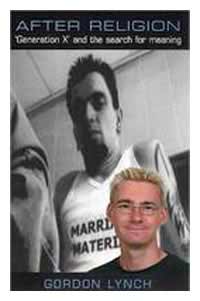 Gordon Lynch’s 2002 book, “After Religion: ‘Generation X’ and the search for meaning”, offers a refreshing UK critique of popular writing on generational theory, culture and theology. In this book he’s exploring the validity of generational theory in describing changes in religious attitudes. His work focuses on late or post modernity as a wave as another way of interpreting the trends usually associated with ‘Generation X’.
Gordon Lynch’s 2002 book, “After Religion: ‘Generation X’ and the search for meaning”, offers a refreshing UK critique of popular writing on generational theory, culture and theology. In this book he’s exploring the validity of generational theory in describing changes in religious attitudes. His work focuses on late or post modernity as a wave as another way of interpreting the trends usually associated with ‘Generation X’.
Gordon Lynch, a lecturer in Practical Theology at the University of Birmingham, specialises in faith and culture studies. He’s writing as a ex ‘evangelical Christian’ with a strong sense of cynicism about the limited relevance of mainstream Christianity to the general population. He begins with a consideration of pessimistic outlooks for Christianity by Steve Bruce, an Aberdeen sociologist who points to the undeniable decline of church attendance in the UK. This is contrasted with the views of Grace Davie, sociologist in Exeter. Davie argues that attendance of worship is not the best way to gauge religious interest.
Lynch concludes that while institutional religion is on the decline, there is a continuing need or desire for personal meaning that may or may not make use of religious ideas or symbols.
Reading from an Australian/NZ perspective, I find I’m already living in the kind of situation Bruce predicts. He’s saying that by 2030 fewer than 10% of babies will be baptised. That would be more than are baptised here in Oz, particularly as the evangelical stream of churches don’t baptise babies anyway! Christendom has always struggled to find its home here.
Lynch goes on to contrast the UK situation with the spiritual marketplace of contemporary America, drawing specifically on Wade Clark Roof’s research. Despite the higher rate of stated involvement in instutional religion in the States, even there sociologists are noticing a trend towards a personal approach to reality that draws on a number of sources and traditions.
That’s the first chapter in a nutshell.
